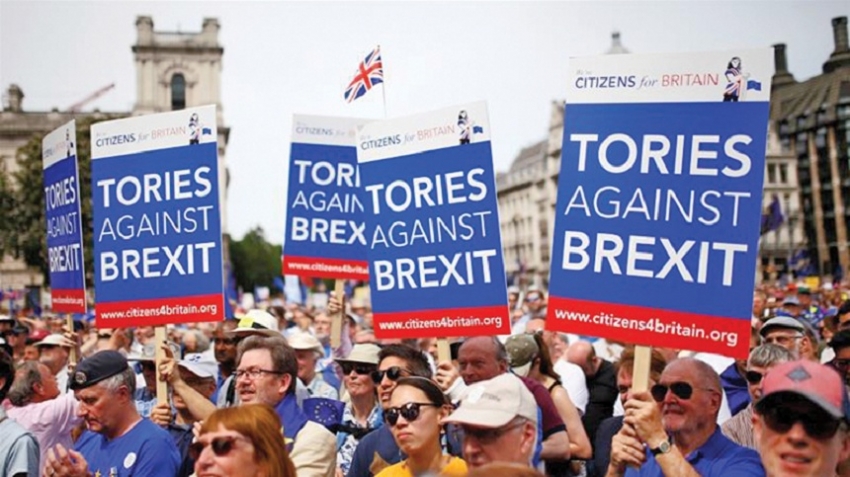For the prime minister’s Europhobe supporters, Brexit has become nothing less than a religion. But it will never be the road to paradise.This was the third People’s Vote march I have joined – the most sombre, with the blackest humour. We could all read the runes: the best we could hope for was deferring the vote. Instinctive Tory tribalism and Jeremy Corbyn’s endless temporising had delivered insufficient momentum to muster parliamentary support for a second referendum.
Still, we cheered at the news that Oliver Letwin’s procedural deferment to avoid no deal had passed. But we knew that in a few weeks, barring Boris Johnson’s lies being quickly exposed, or his misplaying of the politics again, it could all be over – and a new fight that could last years would begin. To rejoin.
For despite our numbers, our witty placards (“Can’t we leave the Eurovision song contest instead?”) and our passion, mainland Britain might soon leave the EU in an ultra-hard Brexit and at the beginning of 2021 cut loose from not only Europe’s political institutions but its economic framework.
All that would be left would be a contestable figleaf of some yet-to-be-negotiated, second-order free trade deal to reframe our relationship with our continent and our friends.
2016 referendum
We, the marchers, are dismissed as the anti-democrats, even though we are calling for a second vote vital to validate such a fateful path for our country, one that did not surface in the 2016 referendum.
Instead, we are told we have to knuckle down and respect what took place three years ago. If we don’t, there will be riots and blood in the streets, it’s said.
It is all so alien. Flammed-up fears of riots in the streets being deployed to inhibit democratic argument? A second vote – a vote! – being undemocratic? This is not democracy, but the tyrannous use of a one-off plebiscite to silence the 16.1 million of us – now certainly more – who want to stay in the EU.
Is this democracy? England has been enslaved by a section of the British right animated by what has become Europhobic faith. Onlookers report that Theresa May would bury her head on the table after her attempts at salvaging a little from the wreckage were once again dashed by the self-styled “Spartans” and ask: what will they do once we have left the EU?
For them, Brexit is a religion, a reason for being, a lifestyle. Brexit is not a policy or a feasible strategic direction for the country, as we have learned.
You can’t reason with them, when they argue, for example, about the number of independent trade deals that they imagine can be done to substitute for what we will lose. These deals just don’t exist.
British democracy has mutated from an arena where those with a different hierarchy of values try to deploy the best argument into faith-based politics – matched on the left by the ultras around Corbyn, the complement to the Tory Spartans. For them, the greater issue is not to win a general election with an attractive, broad-based Labour party. Instead, it is to retain control of the party as a Corbynite tribune in the wake of what promises to be a devastating defeat. Thus the mounting protests from Labour constituencies around the country at the long lists of potential candidates for safe seats being decided by the Corbyn-controlled national executive committee, excluding anyone deemed not to subscribe to the true religion. What matters is to have enough Labour MPs in the wrecked post-general-election Labour party who will carry the Corbynite flame, whatever.
Political compromise
The borderline between passionately holding a set of values and faith may be fuzzy, except looking at, say, Peter Bone or Mark Francois on the Europhobic right or Jon Lansman on the Corbynite left, you can quickly recognise those who have crossed the line. The new faith-based politics even starts to distort a definition of political bravery or conception of political compromise. So Europhobe Iain Duncan Smith is able to adopt the mantle of sweet reasonableness, pointing to all his trivial compromises, as he swings behind an arrangement that will devastate the supply chains and export markets of key manufacturing sectors, cuts loose Northern Ireland and will set in train Scottish independence. Equally, Melanie Onn, Labour MP for Grimsby, congratulates herself on her “bravery” as she capitulates to vote for a deal that will devastate working-class communities across the Midlands and the north of England. Looking back, not only to the referendum but to the years before, it’s clear that the greatest weakness of the pro-EU cause has been an inability to find ways of fighting Europhobic faith with passionately argued reason. The capacity to compensate with vivid argument, speaking from the heart, has been absent: why, despite everything, Remain commands only a small majority in the country even now. Amazingly, it fell to the 86-year-old Michael Heseltine to make the best speech at the last march.
- The Guardian




















